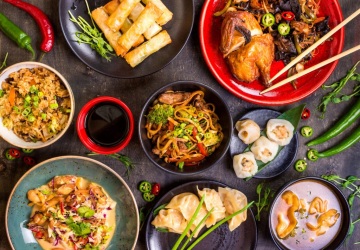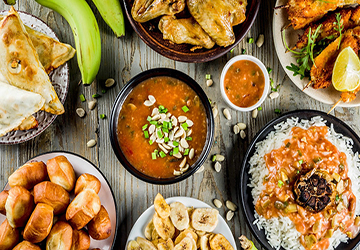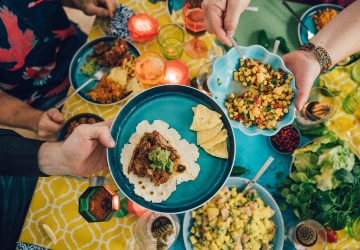The African continent, rich in its cultural diversity and historical tapestry, offers a culinary journey as expansive as its landscapes. African food exploration isn't just about tasting different dishes but understanding the stories, traditions, and communities behind every bite. From the Maghreb in the North to the coastal cuisines of West Africa and the robust flavors of the East, every region brings a unique taste to the African palate.
The Immense Diversity of African Dishes
When one embarks on the journey of African food exploration, they are met with abundant flavors, textures, and culinary techniques. From the spicy tagines of Morocco to the fish stews of Senegal and the famous Ethiopian injera, the variety is endless.
Nigeria's jollof rice and Ghana's variant engage in a friendly rivalry for the crown of the best jollof. Meanwhile, South Africa's bunny chow – a hollowed-out loaf of bread filled with curry – stands out as an innovative and flavorful treat. But the journey doesn't end there; each nation, each tribe even, has its version of a beloved dish, showcasing the immense diversity of African dishes.
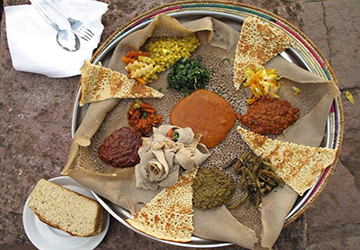
Culinary Traditions: More than Just Food
Behind every dish lies a story, a tradition, and a community. The culinary traditions of Africa are deeply rooted in its history, environment, and community values. For instance, eating Ugali in East Africa isn't just about savoring the maize porridge; it's about the hands that crafted it and the generations that passed down the recipe.
In many African cultures, meals are communal affairs, with families and friends coming together to share food and stories. Preparing the food can often be as important as the food itself. Rituals, ceremonies, and festivals frequently revolve around specific dishes, making the culinary experience an integral part of the African societal fabric.
The Expanding African Palate: Fusion and Evolution
The African palate has never been static. With the influx of international flavors and ingredients over the centuries, from the Arab traders of the past to the global fusion trends of today, African cuisine is ever-evolving. Dishes like Moroccan couscous or Cape Malay curry in South Africa show how African cuisine has absorbed and integrated influences worldwide.
Moreover, as African chefs and home cooks travel and gain exposure to global culinary trends, they bring back new techniques and flavors, incorporating them into traditional dishes and creating entirely new ones. This dynamic exchange ensures that the African culinary landscape remains vibrant and innovative.
Exploring Beyond the Plate
Engaging in African food exploration isn't just about tasting different foods but understanding the rich tapestry accompanying each meal. The spices tell tales of ancient trade routes, while cooking techniques reveal historical interactions and migrations.
Furthermore, with the growing global interest in African cuisine, there's a golden opportunity to showcase the diversity and depth of African dishes. Understanding and appreciating the food allows one to glimpse African communities' hearts, challenges, joys, and undying spirits.
Savory Staples: Backbone of African Meals
● Fufu: A West African staple made by boiling and pounding starchy vegetables, often served with soups and stews.
● Injera: This sourdough flatbread from Ethiopia serves as a plate and accompaniment for various dishes.
● Sadza/Pap: Central to southern African meals, this maize porridge can be soft or firm and is often paired with meat or vegetable relishes.
Spices and Flavors: The African Symphony
Africa's spice trade history is vast and varied. Every region has its set of spices that define its cuisine.
● Berbere: A fiery Ethiopian spice mix containing chili peppers, fenugreek, and other aromatic spices.
● Ras el Hanout: This spice blend from North Africa can contain up to 30 different ingredients, offering a symphony of flavors.
● Harissa: A spicy chili paste from Tunisia that adds heat and depth to dishes.
Street Foods: Tastes on the Go
Street food is a vibrant part of African food exploration, offering a glimpse into the day-to-day flavors locals love.
● Kelewele: Spicy fried plantains popular in Ghana.
● Suya: Grilled meat skewers coated with spicy peanut mixture, a favorite in Nigeria.
● Bunny Chow: South African fast food with a hollowed-out loaf of bread filled with curry.
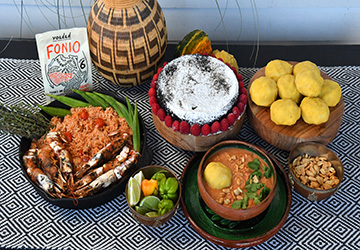
A Journey Through Regional Cuisines
● North Africa: Known for its flavorful tagines, couscous, and aromatic spices. Essential dishes include Moroccan lamb tagine and Egyptian koshari.
● West Africa: Rich, hearty stews and jollof rice dominate. Signature dishes include Senegalese chicken yassa and Nigerian egusi soup.
● East Africa: From Ugandan matoke to Tanzanian Zanzibar biryani, the region offers native and Indian-influenced dishes.
● Southern Africa: Boerewors from South Africa, kapenta from Zimbabwe, and piri-piri chicken from Mozambique highlight the area's diverse culinary heritage.
The Role of Food in Celebrations and Rituals
African culinary traditions aren't just about everyday meals. Food plays a pivotal role in celebrations, rituals, and ceremonies.
● Kwanzaa: An African-American celebration honoring African heritage, with dishes like collard greens symbolizing prosperity.
● Durbar Festival: Held in Nigeria, where various traditional foods are served, celebrating the region's rich history.
● Coffee Ceremony: An integral part of Ethiopian culture, this elaborate ritual is about more than just brewing coffee—it's about community.
Sustainability and African Culinary Practices
Long before it became a global trend, many African communities practiced sustainable cooking out of necessity and tradition.
● Nose-to-tail Eating: Utilizing every part of an animal to ensure nothing goes to waste.
● Seasonal Eating: Consuming fruits and vegetables in peak season for optimal flavor and nutrition.
● Foraging: Many communities rely on wild foods, from mushrooms to herbs, as staples.
Every aspect of African food exploration adds depth to the narrative, from the humble street food vendors to the grand feasts during celebrations.
Conclusion
Here is a complete guide to African cuisine. Whether you're a seasoned foodie or someone just beginning their African food exploration, the continent promises an enriching culinary experience that transcends borders and tantalizes the African palate. Remember, each bite isn't just a taste but a story waiting to be discovered.

